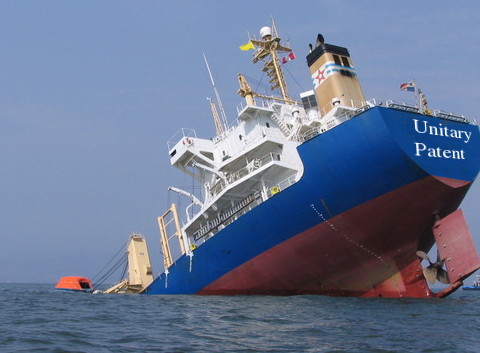

"The UPC as we know it is dead. It's a dead project whose only salvation might come through restructuring, renaming, etc."We went against the current of EPO lies and Team UPC lies and we expect nothing to happen by tomorrow (when it comes to ratification in the UK). It throws the whole thing into a massive, inevitable limbo again. The UPC as we know it is dead. It's a dead project whose only salvation might come through restructuring, renaming, etc.
For those who don't know why the UPC is bad, see this press release that we co-authored earlier this month. The UPC is -- among other things -- about making outrageous patent scope, i.e. software patents, "universal" or "unified" in Europe. It's a massive risk to Europe.
The Liar in Chief has just been to Brussels in one last (and desperate) effort to salvage the UPC, but he too begrudgingly contradicted himself by refuting previous statements that he made.
"Will IAM apologise for misleading readers?"IAM, the eternally-loyal propaganda mill of the Liar in Chief wrote about it yesterday: "Support for UPC among MEPs, says EPO president. But still no UK ratification & this week Article 50 is invoked."
So who was right and who was wrong? Will IAM apologise for misleading readers? How about all that fake news that IAM has been spreading about Spain earlier this month? Yesterday we found this new article from Hogan Lovells (via social media and EPO insiders who told us about it). It's titled "False alarm: Spain will not join the Unitary patent system after all," but it was not a false alarm. It was just fake (or highly distorted) news from Team UPC firms. Their contagious lies (they said to each other what they wanted to believe) were accepted by many, included media, but as we said all along, Spain was definitely not close to ratification, for the following reasons:
(a) Spanish companies would not be able to file European patents with unitary effect ("Unitary patents") in their own official language, Spanish.
(b) Since the Unitary patents would not need to be translated into Spanish in order to produce effects in Spain (unlike the case of "traditional" European patents), the Spanish companies would not benefit from the disclosures therein.
(c) The linguistic regime would also produce legal uncertainty for Spanish companies, which would have to respect the rights conferred by more than 95,000 new patents per year (not translated into Spanish). Spanish companies would, then, bear the costs of the relevant translations.
(d) Moreover, Spanish companies would be forced to plead in English, French or German in invalidity and non-infringement declaratory proceedings which would be heard by the Unitary Patent Court ("UPC") central division. Spanish companies sued for infringement before the local divisions would also have to litigate in a language other than Spanish chosen by the patentee.